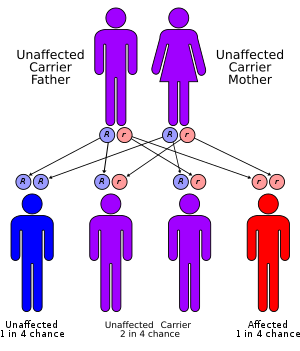ZAP70 deficiency
ZAP70 deficiency, or ZAP70 deficient SCID,[1] is a rare autosomal recessive form of severe combined immunodeficiency (SCID) resulting in a lack of CD8+ T cells.[2] People with this disease lack the capability to fight infections, and it is fatal if untreated.
| ZAP70 deficiency | |
|---|---|
 | |
| ZAP70 deficiency has an autosomal recessive pattern of inheritance. |
It is cause by a mutation in the ZAP70 gene.
Presentation
Children with this condition typically present with infections and skin rashes.[3] Unlike many forms of SCID, absolute lymphocyte count is normal and thymus is present.
Cause
ZAP70 deficiency SCID is caused by a mutation is the ZAP70 gene, which is involved in the development of T cells.[3]
Diagnosis
It is characterized by a lack of CD8+ T cells and the presence of circulating CD4+ T cells which are unresponsive to T-cell receptor (TCR)-mediated stimuli.[4] Diagnosis is usually made within the first six months of life. Genetic testing is required.[3]
Treatment
Hematopoietic stem cell transplantation is the only known cure for ZAP70 deficient SCID.[5]
Epidemiology
ZAP70 deficiency SCID is estimated to occur in approximately 1 in 50,000 people. Fewer than fifty people with this condition have been identified.[3]
References
- Online Mendelian Inheritance in Man (OMIM): 176947
- Otsu M, Steinberg M, Ferrand C, et al. (2002). "Reconstitution of lymphoid development and function in ZAP-70-deficient mice following gene transfer into bone marrow cells". Blood. 100 (4): 1248–56. doi:10.1182/blood-2002-01-0247. PMID 12149205.
- Reference, Genetics Home. "ZAP70-related severe combined immunodeficiency". Genetics Home Reference.
- ZAP-70 Deficiency at Merck Manual of Diagnosis and Therapy Professional Edition
- "UpToDate". www.uptodate.com.